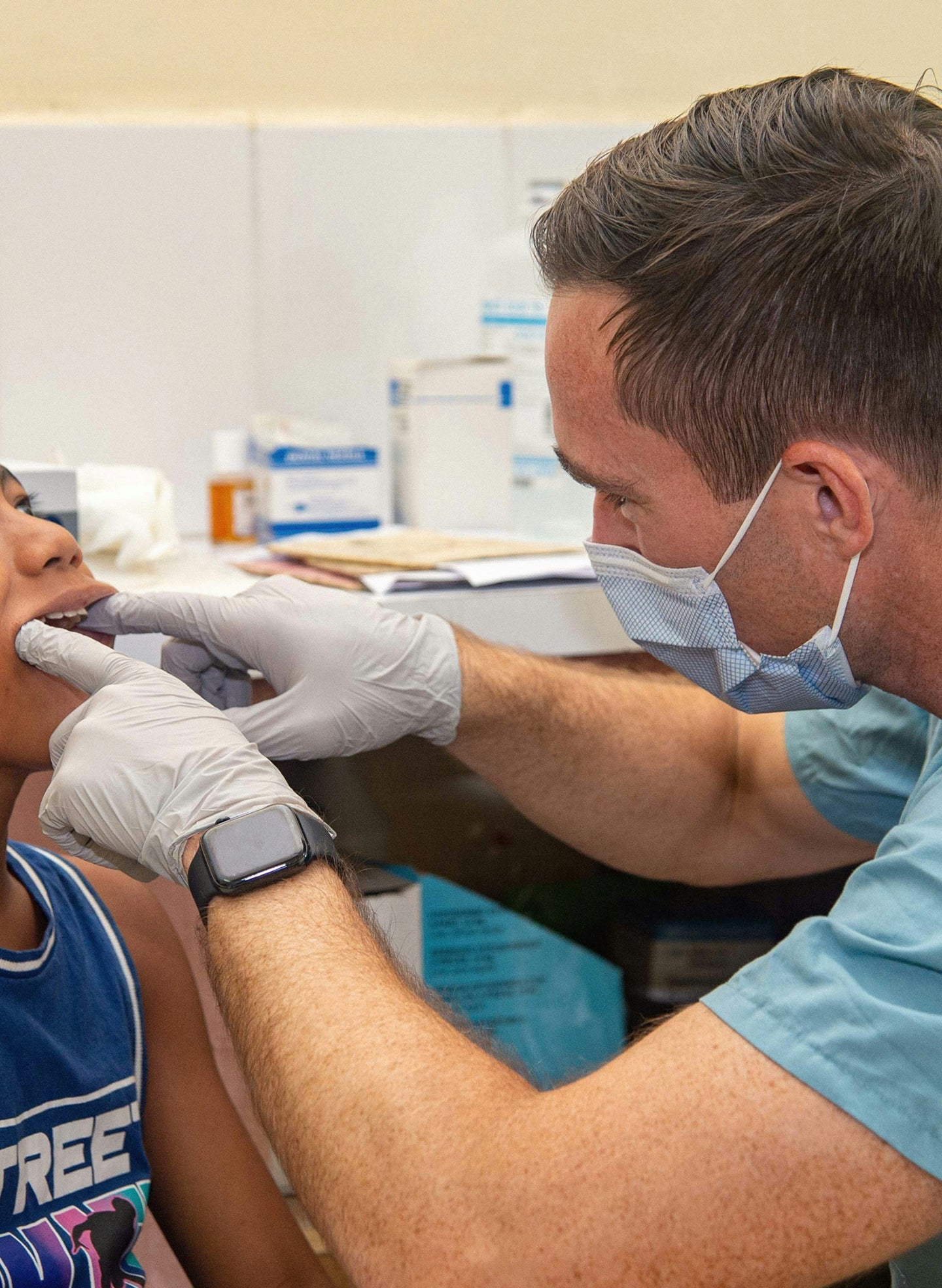Last updated 09.08.2025
Osteoporosis and dental implants: What you need to know
If you have osteoporosis, you may still be eligible for dental implants. Learn about impacts and precautions.

Learn more about Dr. Karina Rochabrun
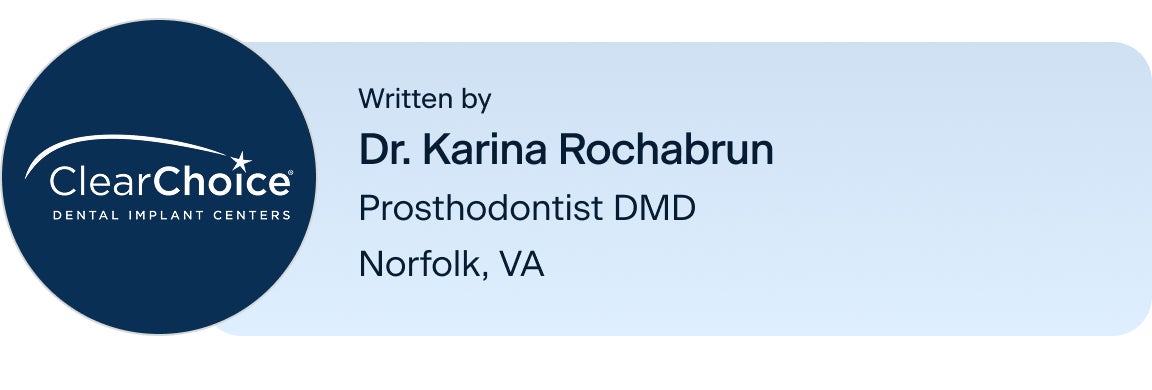
Dental implants are a trusted solution for replacing missing teeth — but if you’ve been diagnosed with osteoporosis, you might wonder: Am I still eligible? The good news is that many people with osteoporosis are excellent candidates.
This guide explains what you need to know about bone quality, medications like Fosamax®, and how ClearChoice assesses implant eligibility with care and precision.
Can people with osteoporosis get dental implants?
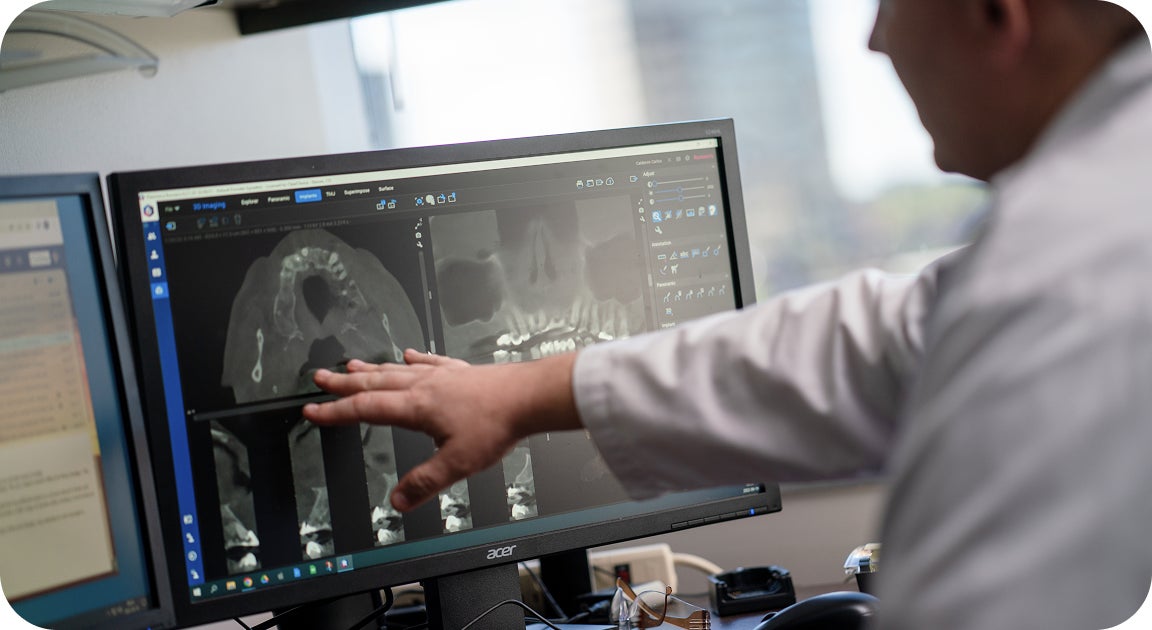
Yes — many people with osteoporosis are still eligible for dental implants. While osteoporosis affects bone quality, it doesn’t automatically disqualify you from treatment.
How bone quality and healing are evaluated
At ClearChoice, your care team will evaluate your overall bone health using diagnostic imaging. The most important factor is whether you have sufficient bone volume in the jaw to support implants and what treatments you may have had for your osteoporosis.
If needed, procedures like bone grafting can be used to help build up the jawbone and improve implant stability. Your implant eligibility may be impacted if you have other health conditions.
What role does bone loss play in implant eligibility?
Osteoporosis can contribute to bone loss in the jaw — but so can gum disease, tooth loss, and tooth infections. Even if you’ve experienced bone loss, you may still be eligible for implants.

What your evaluation includes (CBCT, bone quality, treatment planning)
ClearChoice patients often ask what their cost will be. While every case is different, we strive to offer clear, up-front pricing. Please keep in mind ClearChoice centers do not accept insurance. A patient will be provided a detailed treatment plan that they can submit to their insurance team for direct reimbursement, if any. If you have questions about insurance coverage, you should contact your insurance provider directly.
During your evaluation, your ClearChoice team looks at:
The quality and volume of your remaining jawbone
Whether bone grafting or a sinus lift is recommended
Whether full-arch implants may be more appropriate than individual implants
For more details on the diagnostic process, schedule a free dental implant consultation at ClearChoice.
How do medications like Fosamax® or Prolia® affect treatment?
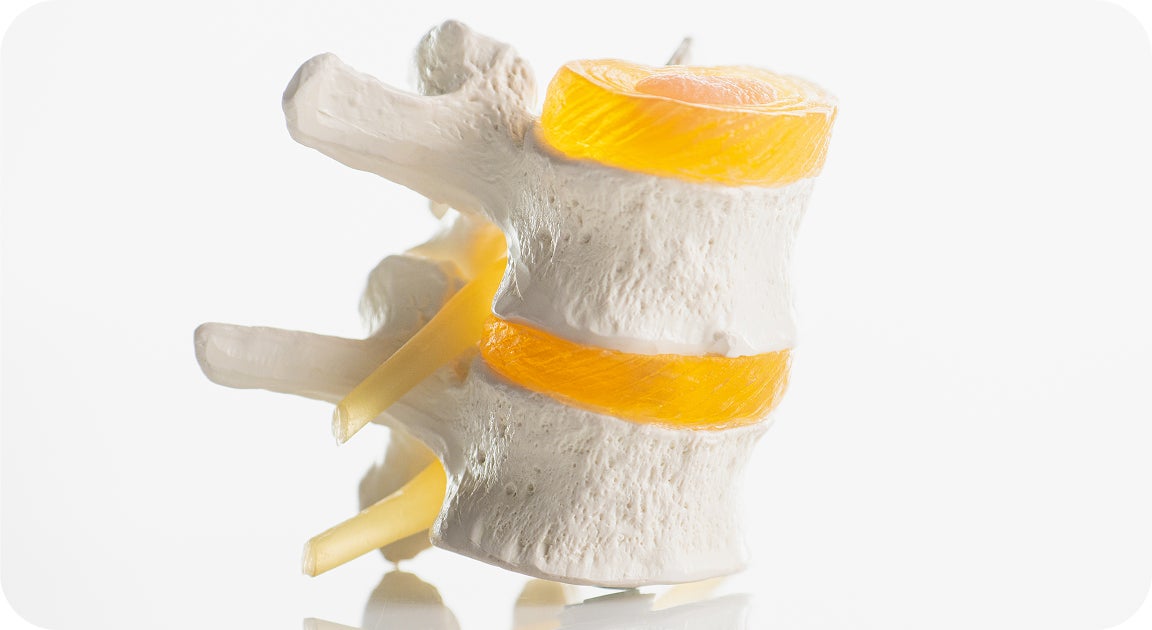
Some osteoporosis medications change how bone remodels and can affect healing after jaw surgery. This consideration applies not just to implants, but also to tooth extractions and other procedures on the jaw.
Common medications include bisphosphonates (e.g., Fosamax®, Boniva®, Reclast®) and denosumab (Prolia®). The overall risks are low, but they can include delayed healing and, rarely, osteonecrosis of the jaw (ONJ). Risk varies with the type of drug, dose, and duration of use.
What your prosthodontist will review
Your ClearChoice team will review:
Which medication you take, how long, and when your last dose was
Other factors that may influence healing (e.g. long-term corticosteroids)
Your overall health and bone quality based on imaging
Most patients on osteoporosis medications can still pursue implant treatment safely after a careful evaluation. Your ClearChoice prosthodontist will coordinate with your physician to determine the safest plan and any precautions. If implant surgery isn’t advisable right now, your team will discuss timing and alternatives tailored to your health history.
Potential risks to discuss in advance (rare)
Potential risks of jaw surgery may include:
Infection
Delayed healing
ONJ (osteonecrosis of the jaw)
Your safety and long-term health are always the priority. Implants, are helping to preserve your oral health for the future.

What if I’ve already lost a lot of bone?
Using available bone with strategic (angled) implant placement
Even with advanced bone loss, options may still be available. Full-arch dental implants can often be placed at strategic angles to help make the most of available bone.
When bone grafting or sinus lift can help
In some cases, bone grafting or sinus lifts can restore the jaw enough to support implants. Learn more about bone grafting and oral surgery procedures, which may be recommended before or during implant placement.
Are there alternatives if implants aren’t appropriate right now?
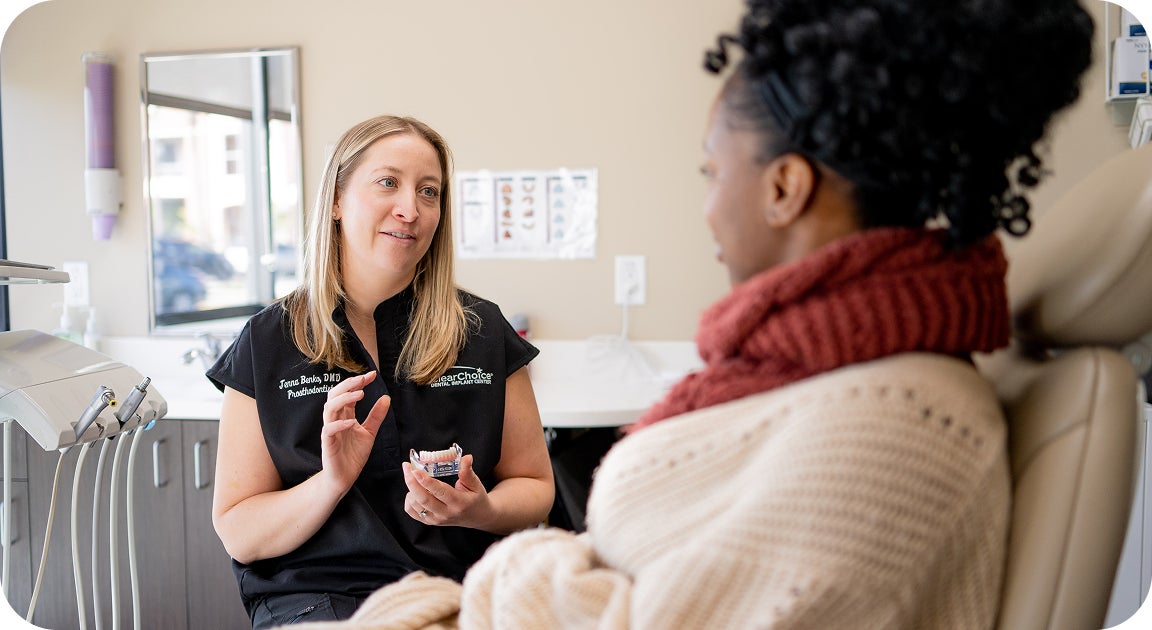
If your ClearChoice prosthodontist determines that implant treatment isn’t advisable at this time—for example, because of medications that affect bone turnover (such as bisphosphonates or denosumab/Prolia) or other medical considerations—non-surgical options may be recommended.
Non-implant options (removable dentures, fixed bridges)
Removable dentures — taken out for cleaning; can be adjusted over time.
Fixed dental bridges — replace one or more teeth by attaching to neighboring natural teeth.
Implant-supported dentures as a removable, implant-assisted option
If fixed full-arch implants aren’t the best fit but implants are still appropriate for you, your prosthodontist may discuss:
Implant-supported dentures (removable overdentures) — a denture that attaches to fewer implants for added stability, while remaining removable.
Your care team will explain the reasons behind each option and help you plan next steps. ClearChoice Dental Implant Centers offer third-party financing options to help make payments more manageable.
“Even if patients don’t choose to move forward with us, I want them to leave with a clearer understanding of what’s going on in their mouth and what they need to address.”
- Dr.Hasan Al Yousuf
How much do dental implants cost if you have osteoporosis?
The cost of dental implants varies based on your health needs and whether any preparatory procedures (like bone grafting) are required.
At ClearChoice, the average all-inclusive price for fixed full-arch dental implants typically ranges from $18,000–$36,000 per arch.¹
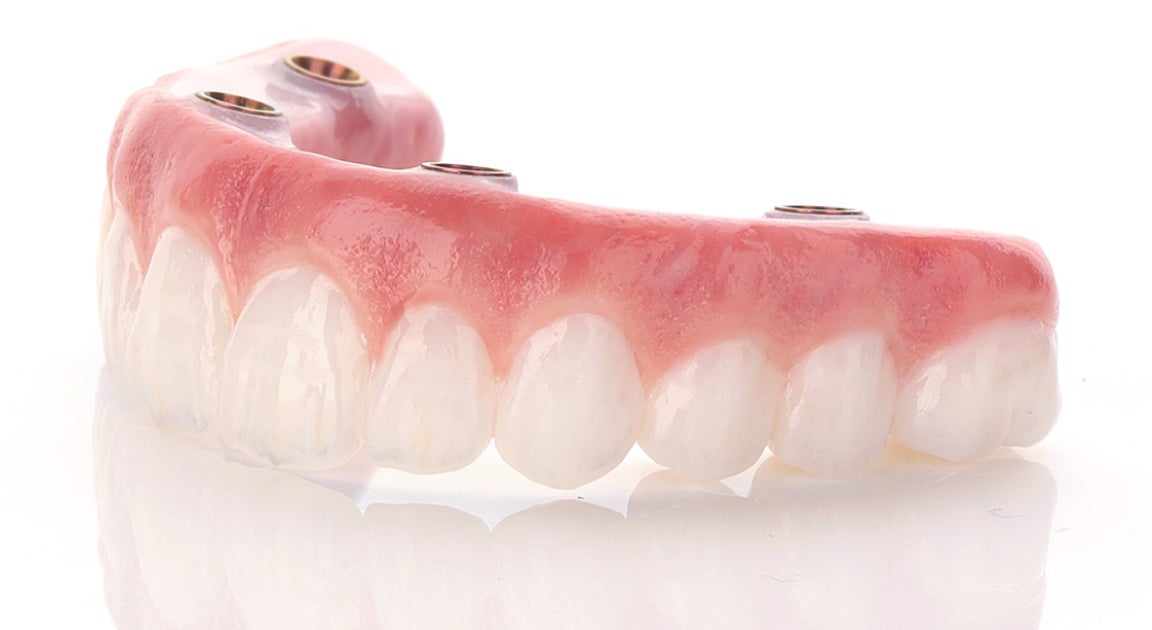
What the all-inclusive full-arch price typically includes
This bundled price generally includes:
Examination and 3D imaging (CBCT)
Custom treatment planning
Surgical care (including extractions when performed as part of the full-arch procedure)
Implant components and abutments
Same-day delivery of provisional (temporary) teeth, when clinically appropriate
Delivery of the final zirconia restoration
Routine follow-up visits during healing
Financing and the single, all-inclusive bill for claim filing
ClearChoice Dental Implant Centers partner with vendors for third-party financing options to help make payments more manageable. While ClearChoice does not accept insurance, patients receive a single, all-inclusive bill that they may use to file a claim with their insurance provider for potential reimbursement.

ClearChoice also offers an Insurance Assurance² discount of up to $5,000 ($2,500 per arch) for zirconia arches when you show proof of dental insurance, even if your plan doesn’t cover implants.
At your free consultation, your care team will provide personalized imaging, evaluate eligibility, and walk through transparent pricing — with no hidden fees.
¹Average price paid nationwide including all available discounts. Doctor evaluation required.
²Valid at participating centers only. Discount off fixed full arch dental implants, $2,500 per arch. Maximum discount $5,000. Not valid for previous or ongoing work. Cannot be combined with other discounts. Discount taken off usual and customary fees. Contact your local center and show proof of insurance to claim your discount. ClearChoice is not affiliated with any insurance provider, and does not process insurance directly with insurance providers. If you choose to file a claim for reimbursement, you are solely responsible for all communication with your insurance company. Offer ends 12/31/2025.
What should I tell my prosthodontist before implant treatment?
Medications, history, and other details to share
Be sure to share:
Your osteoporosis diagnosis
Any medications for osteoporosis you’re currently taking or have taken in the past (including over-the-counter supplements)
Your history of bone fractures or jaw issues
Clear communication helps ensure the safest, most effective plan — tailored to your needs.
Still have questions? Learn more about what to expect during your consultation.
The bottom line: Osteoporosis doesn’t have to be a barrier
While osteoporosis introduces unique considerations, it doesn’t automatically prevent you from receiving dental implants. With advanced diagnostics, expert providers, and personalized treatment, ClearChoice helps patients with a wide range of health conditions restore their smiles — and their confidence.
Every patient's health history is different — but with the right approach, many people with osteoporosis can successfully restore their smile. At ClearChoice, you’re never just a case file — your care is personalized from day one.
Schedule your free consultation with a ClearChoice prosthodontist today — and take the first step toward a personalized path forward.

Dental implants and osteoporosis FAQs
Can I take osteoporosis medications like Fosamax® if I get dental implants?
Possibly, but your ClearChoice team will need to evaluate your specific health history, dosage, and how long you've been taking the medication. Some medications can affect healing, but treatment plans can often be adjusted safely with medical guidance.
Do I need strong bones to get dental implants?
You don’t need perfect bone quality—but you do need enough healthy jawbone to support implant placement. Diagnostic imaging will help determine if a bone graft or angled implant approach is needed.
Does osteoporosis prohibit dental implants?
Not necessarily. Osteoporosis is a manageable condition that often doesn’t interfere with implant eligibility. In most cases, your provider will evaluate your current bone volume and overall health rather than making a decision based on diagnosis alone.
Should I tell my prosthodontist if I have osteoporosis?
Yes—always. Sharing your full medical history (including supplements and osteoporosis medications) helps ensure a safe and personalized treatment plan.



